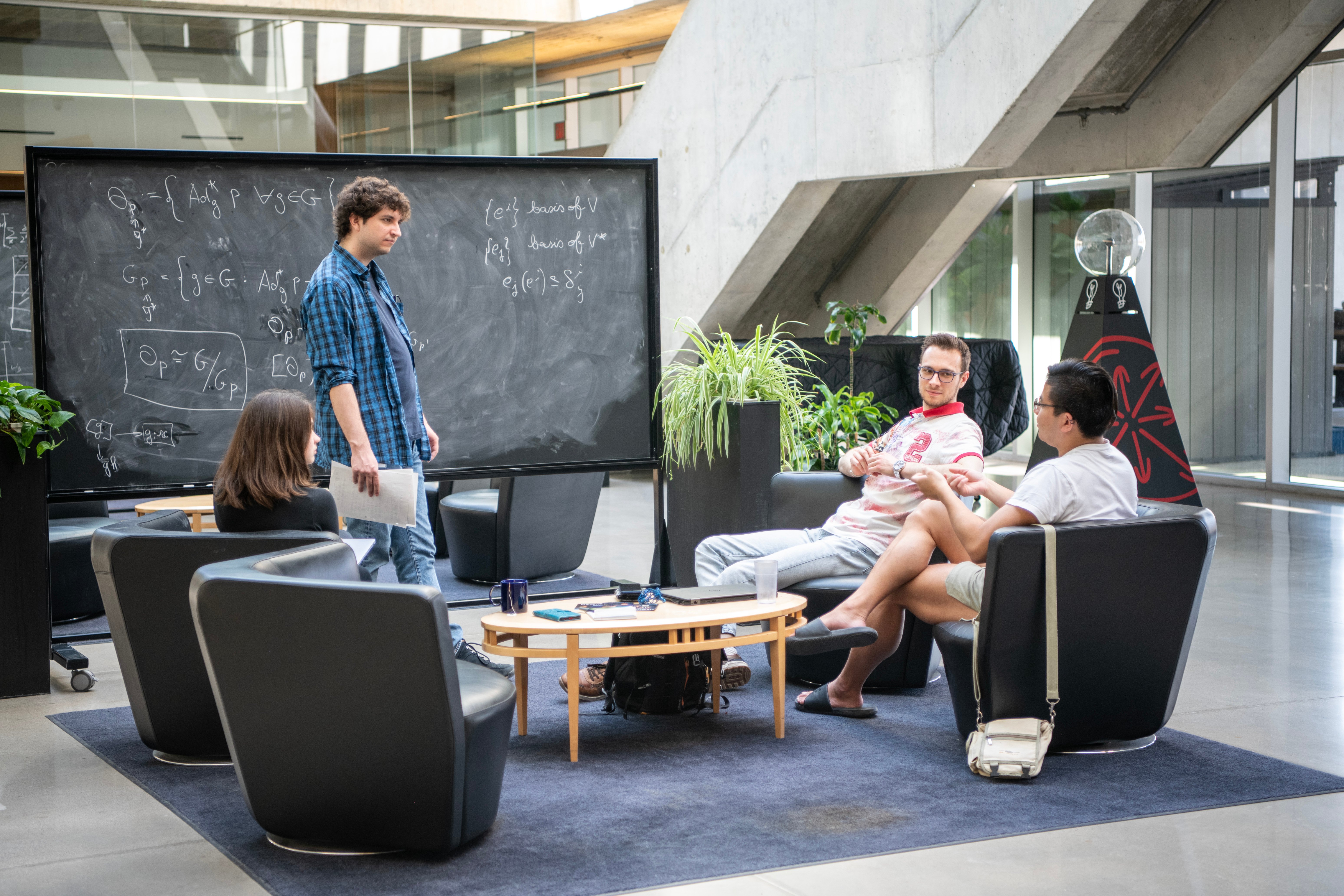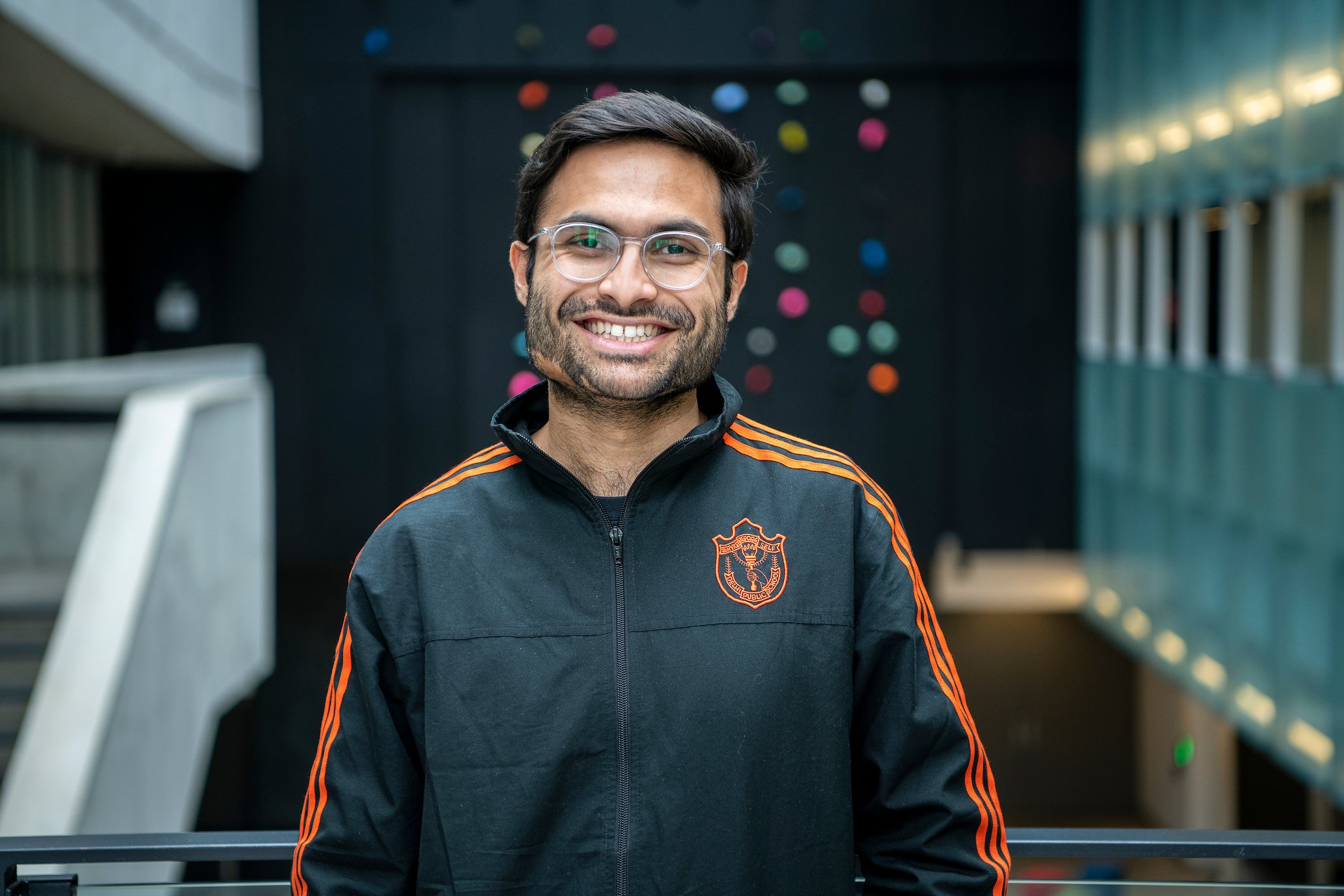Manu Srivastava has always been drawn to big questions.
“My first memory of why I got interested [in physics] was going on drives with my dad and older brother,” Manu reflected. “He introduced me to things like gravity and how it can be considered a curvature in spacetime.”
It was on those drives that Manu became fascinated with the power of the human mind.
“There can be one person sitting at his desk with just a pen and a paper, and still figure out how far away stars work, or how the universe expands.”
Those conversations with his dad and brother ignited a curiosity that has shaped his journey ever since, centred on profound questions that continue to inspire him today, like ‘How did the universe begin?’ ‘How does everything work together?’ and ‘Why does everything behave the way it does?’
Now, Manu is building his career on that love of big questions. Yet it was a single, small question – ’What if I try again?’ – that ultimately brought him to the Perimeter Scholars International (PSI) program in 2021.
While applying to PhD programs across North America and Europe, Manu decided to reapply to Perimeter Institute after missing out on an internship at Perimeter a few years earlier. It was a decision that changed everything. Despite rejections from every PhD program he applied to, Perimeter saw his potential and accepted him into PSI’s 2021–2022 class.
The PSI program is a rigorous one-year master’s program in theoretical physics offered by Perimeter in partnership with the University of Waterloo. It provides highly motivated students with an interdisciplinary education in areas like quantum mechanics, general relativity, and cosmology, taught by leading physicists. With its collaborative, problem-solving focus, PSI equips graduates to excel in research and push the boundaries of theoretical physics.
For Manu, participating in the PSI program exposed him to a breadth of physics topics he hadn’t encountered during his undergraduate studies in engineering at the Indian Institute of Technology in Mumbai. He saw Perimeter as a bridge, transitioning him from the practical problem-solving of his undergraduate work to the formal theoretical physics he was passionate about pursuing.
One of the most transformative lessons Manu took from the PSI program was learning to overcome the fear of asking questions and embrace the natural curiosity that had guided him into the field of physics. “I used to be very reluctant to ask questions,” he admitted. “I’d worry if the question was up to the mark or appropriate for the occasion. But at Perimeter, I never felt too dumb to ask anything. That welcoming environment made it a habit for me to just ask.”
He reflected that while some of his questions might still feel silly since he is a novice in his field, they often open doors to deeper understanding and interesting discussions, and he no longer hesitates to ask them.
“Now, I’m not worried about what other people will think if I ask this question.” This shift in behaviour continues to shape his approach to research and collaboration.
However, it wasn’t only the research and coursework that expanded Manu’s horizons; it was the curiosity and passion of his classmates and the community at Perimeter that intrigued him. He found himself asking the question, ‘What excites people about their research?’
Determined to understand the motivations driving his peers and mentors at Perimeter, Manu immersed himself in as many topics as possible, taking on extra courses, eager to learn about the big questions his friends were chasing.
The friendships Manu forged during his year in Waterloo were an unexpected highlight of the PSI program. Despite the intense academic challenges, the group of PSI Scholars found time to connect outside the classroom, blending their diverse cultural backgrounds with classic Canadian experiences. Manu fondly recalls seeing snow fall for the first time and building a snow fort with his friends – or more of a snow tunnel, he modestly clarifies. These unexpected social connections are one of the things Manu holds most dearly from his time at Perimeter, and he considers it to be a unique strength of the program.
“Some of my best friends are from the PSI program,” Manu says. “I still talk to someone from the program every week.”
These friendships, born in the unique environment at Perimeter, have become a lasting source of support and inspiration for Manu as he continues his journey in physics.
And that journey has taken Manu to MIT.
After completing the PSI program, Manu again applied to several top-ranked PhD programs, and this time, he was successful. Manu is currently a PhD student at the Centre for Theoretical Physics at MIT, where he is asking his own big question – can algebraic quantum field theory tools teach us how theories of gravity and quantum mechanics can co-exist in our very own universe?
He is using the lessons he learned at PSI – asking questions and exploring fields he previously knew little about – to answer this question.
When asked if he would do it all over again, his answer was fast:
“Oh, definitely – no doubt at all,” he responded quickly. “Even if I had got into another PhD program, I would still do PSI first. The people were absolutely fantastic, and I learned a bunch.”
About PI
Perimeter Institute is the world’s largest research hub devoted to theoretical physics. The independent Institute was founded in 1999 to foster breakthroughs in the fundamental understanding of our universe, from the smallest particles to the entire cosmos. Research at Perimeter is motivated by the understanding that fundamental science advances human knowledge and catalyzes innovation, and that today’s theoretical physics is tomorrow’s technology. Located in the Region of Waterloo, the not-for-profit Institute is a unique public-private endeavour, including the Governments of Ontario and Canada, that enables cutting-edge research, trains the next generation of scientific pioneers, and shares the power of physics through award-winning educational outreach and public engagement.


